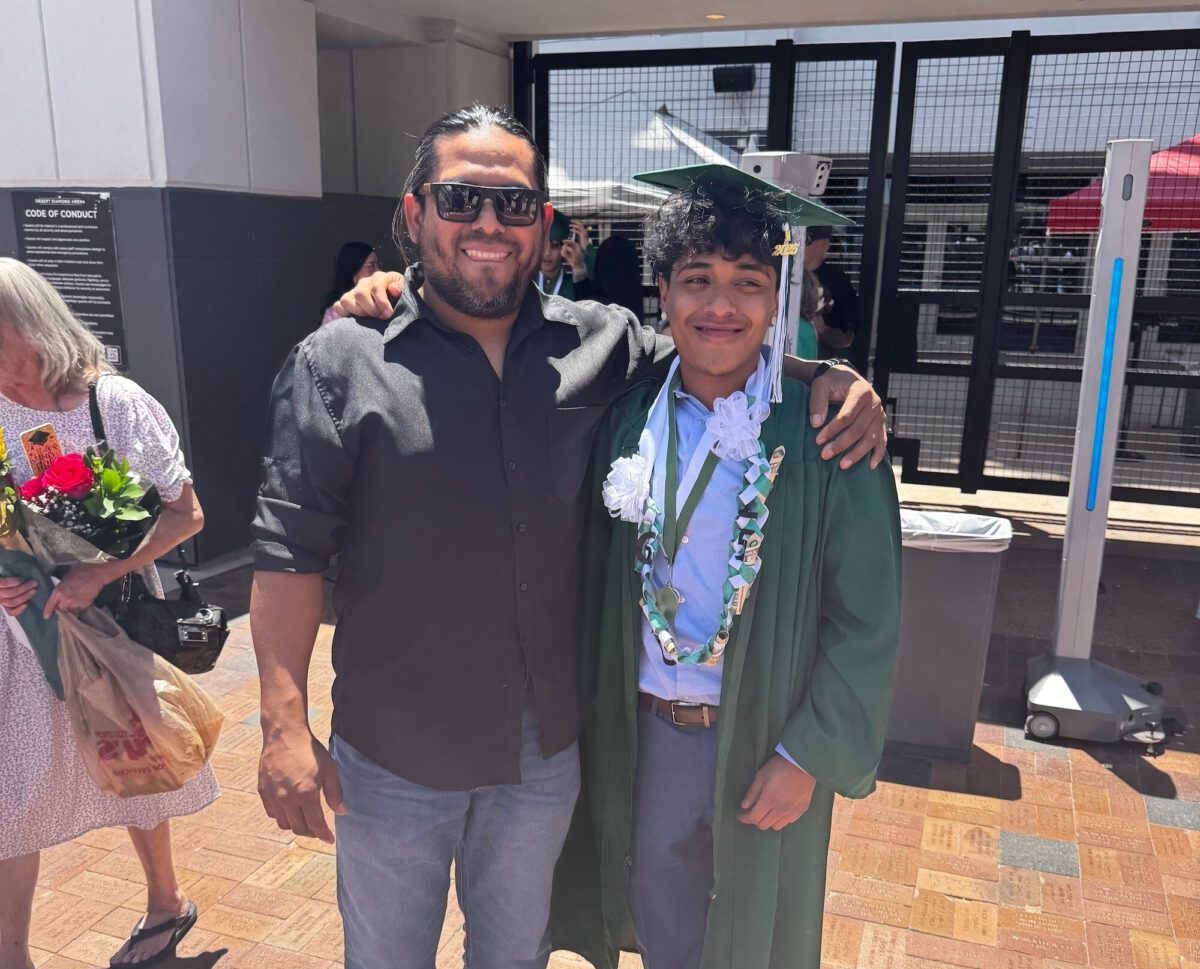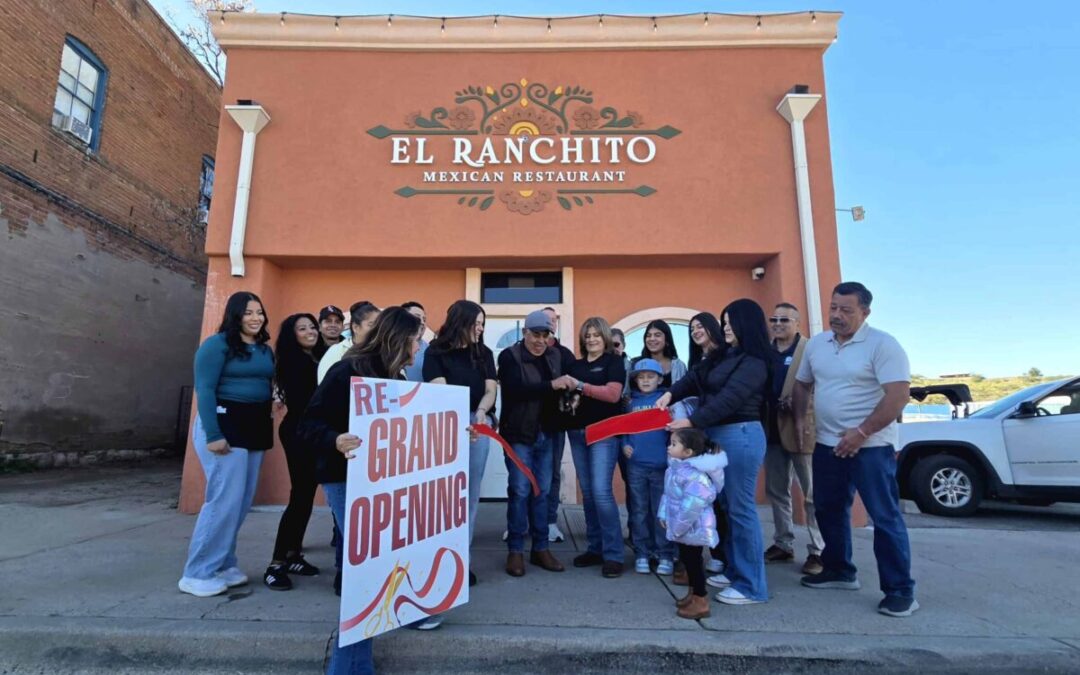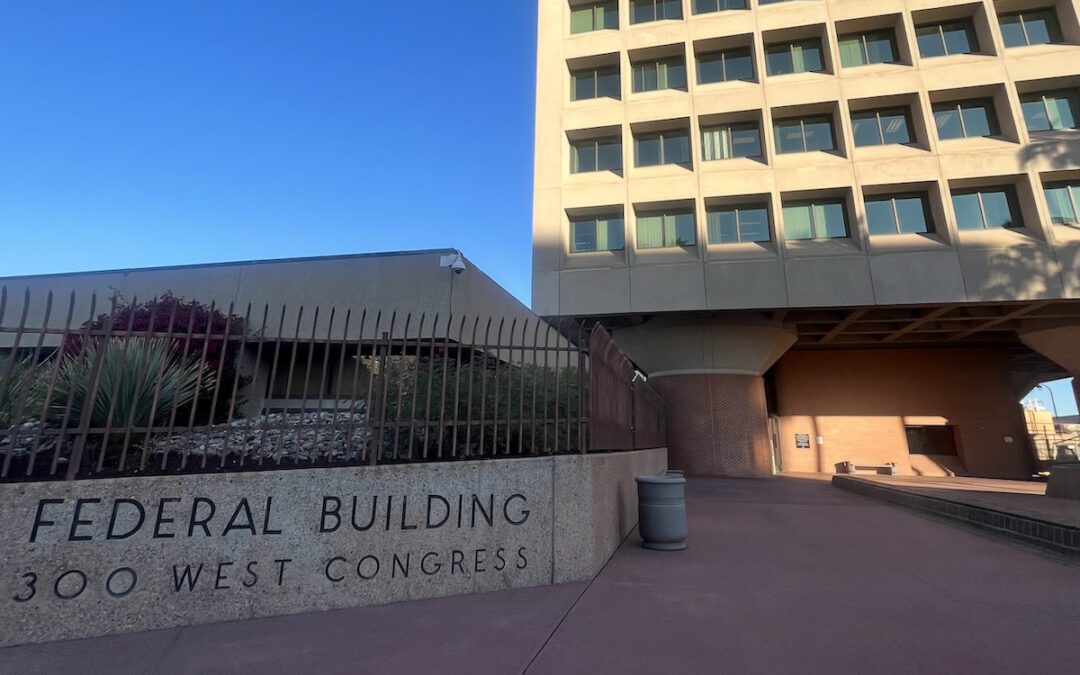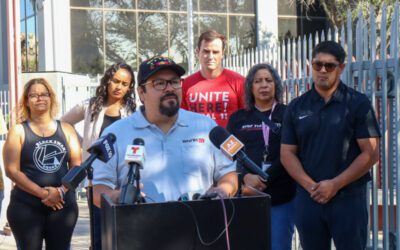
Balbino Mayora and his son during his son’s graduation from Sunnyslope High School in Phoenix. Courtesy of Davina Maes
Balbino Mayora was arrested by Phoenix police over an issue with his vehicle registration. After a court hearing, ICE agents were waiting outside to apprehend him. Now, he’s being held in the Eloy Detention Center, awaiting his fate.
Balbino Mayora has lived in Arizona for nearly 25 years. He fixes cars for a living at his shop, Balbino’s Garage, a small business he opened in 2006. He considers himself a proud American—he’s a business owner, father of two US citizens, and a willing taxpayer.
But on Aug. 26, his life came crashing down.
Phoenix police officers came to his shop that day and arrested him without telling him what his charges were, according to his fiance, Davina Maes.
Phoenix P.D responded to an inquiry about Mayora, but ignored questions about Maes’ account of her fiance’s arrest, and did not clarify if officers informed Mayora the reason for his arrest.
It was unclear to Mayora why he was being apprehended. He was taken to a police station in downtown Phoenix. Eventually, he was able to call Maes and inform her of what had occurred.
After hours of being held, he was charged with five counts of registration to avoid emission control.
Mayora is a “car enthusiast,” Maes said. The owner of many cars, he keeps some of them at a second residence in Williams, Arizona, according to Maes. Three cars, registered in his name, and two others he no longer owns, were all registered in Coconino County, while Mayora resides in Maricopa County.
Arizona law requires vehicles to be registered in the county where the owner or lessor has permanent residence. Emission testing is required in Maricopa and Pima County, but not in Coconino County, where Mayora’s vehicles were.
It was news to both Mayora and Maes, but they didn’t think much of it. Mayora was held overnight at a Maricopa County Sheriff’s Office (MCSO) jail before being taken to court the next day. At court, a judge instructed Mayora to adjust the registration of his vehicles, Maes said.
On Aug. 27, Mayora walked out of the courthouse believing it would be a simple fix. As he was leaving, however, masked US Immigrations and Customs Enforcement (ICE) officers apprehended him and loaded him into a van.
In the midst of the chaos, Mayora was able to call Maes and inform her what happened. Maes could hear the fear in her partner’s voice, whom she normally describes as a very tough and macho guy.
“To hear him as scared as he was just earth-shaking, because he’s not like that. It shook him to the core,” Maes said.
Despite feeling panicked, Maes recalls asking her fiance who had taken him and where they were going. Mayora didn’t have answers.
“They didn’t tell him anything. They just took him into some basement underground and put him there until they determine whether [he’s] going to Florence or Eloy,” Maes said.
Maes asked Mayora to describe his surroundings to her. Mayora explained that they were driving on Central Avenue. With that information, Maes was able to determine they were heading towards the ICE Field Office in Phoenix.
It was unclear to Maes and Mayora how ICE knew he’d be at the courthouse or why he was being detained. They offered no answers, she said.
In a statement, a spokesperson for the Maricopa County Sheriff’s Office (MCSO) declined to specifically discuss the specific circumstances around Mayora’s case, but told the Copper Courier that ICE has a space in their Intake, Transfer and Release facility, and that all booked individuals are screened by ICE.
When the inmate is set to be released, MCSO calls ICE about 30 minutes prior, according to the spokesperson.
“It is on ICE to arrive and take custody of the individual before they walk out,” the spokesperson said.
Courthouse arrests have become a new ICE tactic. In May, masked ICE agents arrested unsuspecting immigrants who were leaving their scheduled immigration hearings in states across the country.
“Nobody would ever get arrested and not know what you’re getting arrested for. You’re being treated like a prisoner,” Maes said. “He was overwhelmed and freaked out. It was extremely traumatic.”
Mayora was sent to the Florence Staging Center before being transferred to the Eloy Detention Center later that night.
Life in the US
Mayora has always loved working with cars, according to Maes. At just seven years old, he helped his father at their family’s mechanic shop in Mexico and over time, developed a love for vehicles.
In an interview, Maes recounted the events that led her fiance to the US.
Mayora and his father’s relationship grew increasingly strained, and at times, physically abusive.
Tierra Blanca, the city he lived in, had high rates of poverty, and he wasn’t sure he had much of a future there. Wanting more for himself, Mayora took the risk of traveling to the US in the pursuit of the American dream.
At 19 years old, Mayora saved enough money to obtain what Maes believes was a six-month tourist visa. In 2001, Mayora planned for a brief visit with the end goal of returning to Mexico and planning a more permanent move to the US, according to Maes.
But once he arrived at the port of entry in Nogales, he quickly fell in love with the US. He moved to Phoenix and began searching for employment. Mayora went place to place in search of a job fixing cars to put his skills to use and support himself.
He was denied employment from many shops due to his inability to speak English, Maes said. Eventually, he met a mechanic experiencing issues with the transmission of a client’s car. Mayora, who had plenty of experience from his time working with his dad, quickly got to work fixing the transmission. The impressed mechanic allowed Mayora to begin working at his shop.
That’s how Mayora began gaining customers who would soon become lifelong friends. When customers needed emergency assistance outside of the shop’s hours, Mayora made himself readily available, offering services out of his apartment parking lot. He saved up as much as he could and put it towards his dream of opening his own shop.
In 2006, his dream came true. He opened Balbino’s Garage, his very own mechanic shop.
Maes said he still has customers from those early days working in his apartment parking lot, and that he’s never formally advertised his business until recently. The community just knows him and trusts him, Maes said.
Americanized
When Mayora’s visa expired, he didn’t think much of it. He was a hard-working, tax-paying American—the type of person he’d always heard about back home in Mexico.
In his 24 years living in the US, he got married and had two children (both of whom are US citizens), got divorced, opened bank accounts, bought cars, dealt with speeding tickets, and learned English.
In 2021, he met Maes, who is also a US citizen. The two were planning on getting married next spring.
Mayora felt Americanized enough. That’s why he wasn’t too concerned when President Donald Trump was elected last year on a platform of mass deportations. Mayora didn’t think he met the criteria of the “criminals” that Trump pledged to go after.
His undocumented status wasn’t top of mind, and he believed that because he entered the US legally, he had nothing to fear with the Trump administration’s threats of mass deportation, Maes said.
That belief was shattered when ICE agents apprehended him outside the courthouse.
“He loves America, it’s given him his whole dream. He’s big on the American dream,” Maes said. “But look what they did. America, the country [he] loves so much, just did this. It’s really heartbreaking.”
Life in custody
Mayora has been detained at the Eloy Detention Center for nearly two months, according to Maes. Mayora often tells Maes about what she calls the “pure evil” within the facility.
“The whole system there is so messed up,” Maes said. “The entire thing is an abuse of power.”
In August, the water was shut off for 24 hours at the detention center, Mayora told Maes.
Maes said thirsty detainees were forced to scoop ice out of Gatorade jugs and let it melt in plastic cups overnight so they would have water in the morning. When Mayora tried to get water from the commissary, he was told the water was sold out, but he could purchase soda instead, according to Maes.
“It’s a weird control thing,” Maes said. “It’s psychological.”
In May, Rep. Yassamin Ansari (D-Phoenix) traveled to Eloy and spoke with detained constituents who said the facility regularly fails to provide reliable access to drinkable water.
To make it easier for Maes to pay Mayora’s bills, the two decided to complete power of attorney paperwork—a legal document that allows someone else to act on your behalf.
They knew better than to put important legal documents in the hands of ICE employees after lawyers, and even an employee within the facility, advised against it.
“Everybody I’ve talked to, [says] ‘give nothing to ICE, because they pretend they never got it,’” Maes said.
That’s why Maes obtained a notary to deliver the power of attorney paperwork directly to Mayora at the facility. The lawyer, however, has not been granted access inside the facility, she said.
Without the completed paperwork, Maes is unable to access his accounts to pay his bills, and worries about how much longer they can continue this way.
Mayora is housed with what he estimates to be about 200 other men, many of whom speak limited or no English, Maes said. Mayora, fluent in both English and Spanish, often acts as a translator for some of the men who are seeking to communicate with officers.
Mayora said the officers often “play dumb,” and refuse to offer assistance when a non-English speaker asks.
“The guys that come up and are speaking in Spanish, they treat them like animals,” Mayora told Maes.
Other times, the facility will have what Mayora described as “random” lockdowns. When Mayora asks officers why they are in lockdown, officers say the lockdown comes as a result of fights breaking out between the detainees. Mayora told Maes he often never sees these fights, however.
When detainees attempt to call their loved ones, officers make up “random rules” to prevent them from making calls, Mayora told Maes.
“It is 100% an abuse of power,” Maes said.
In a statement to the Copper Courier, a spokesperson for ICE denied the claims.
“ICE strongly refutes the false claims made by your ‘source.’ Any assertion that there are subprime conditions at ICE detention centers is categorically FALSE. All detainees are provided with proper meals, water, medical treatment, and opportunities to communicate with family members and legal representatives.”
The spokesperson added, “Lockdowns can occur for several reasons and are done to maintain order and to ensure the safety of detainees.”
Maes is certain that the cruelty within the facility is intentional to encourage detainees to voluntarily depart the US. That’s why she keeps reminding Mayora to stay strong in his fight against removal proceedings.
“I keep telling Balbino, ‘I know that it’s hard in there, and that this is not where you want to be, but you’re taking someone’s seat right now of another dad who might be getting put in there.’”
An empty house
For Maes, it has been jarring adjusting to life without her companion. The house is exactly the same, everything is right where Mayora left it, but there’s a hollowness in his absence.
For Maes, the past few months have felt like an eternity in his absence. “It feels like a year,” she said. “It’s really difficult. For this to be happening to somebody that has done nothing other than be born in Mexico, it’s hard.”
His two children, too, are struggling with their new normal. His 11-year old daughter was always considered the tough one. For weeks, she put on a strong front, until she went to the Arizona State Fair in early October and her father wasn’t with her.
It was a yearly tradition for her and Mayora to attend together. This year, she broke down in tears in the absence of her father, Maes said.
Mayora’s son recently graduated high school and is beginning his adult life. Dealing with the absence of his father has been overwhelming and difficult, Maes said.
In the meanwhile, the family is doing everything they can to secure Mayora’s release. They are in the process of obtaining bond along with fighting removal proceedings scheduled for later this month.
Despite everything, they are trying to remain optimistic that Mayora will be released and reunited with his family, his business, and the country he loves.
Maes credits the community for helping the family get by. One of Mayora’s friends has stepped in to take care of his business during his absence, and the community has raised nearly $12,000 to assist with legal costs.
Maes is calling on the Trump administration to show mercy for people like her fiance, who have never been convicted of a crime and have become staples of their community.
“The people in there are hard workers. They’re tax paying citizens by anything other than a paper, they are living the American dream,” Maes said. “The one difference is that maybe they crossed over X amount of years ago.”
The family has set up a SpotFund to assist with legal costs.

In Tucson, Republican Juan Ciscomani is portrayed as a grinch “who stole healthcare”
Democrats are targeting the Republican Congressman for failing to protect Tucson residents' access to healthcare. Despite verbal commitments to...

Resilience and a Red Ribbon reopening tour in downtown Globe
The fall flooding devastated downtown Globe. Resilience prevails with the reopening of nine businesses. The flooding in Globe wreaked havoc on the...

Three-year-old child forced to serve as her own attorney in Tucson immigration court
More than a dozen undocumented minors were forced to serve as their own attorneys in front of an immigration judge as the Trump administration ramps...

14 Arizona-based nonprofits to support this holiday season
For many, the end of the year is a season of giving. If you’re searching for organizations that could use your help (whether it be your money, time,...





